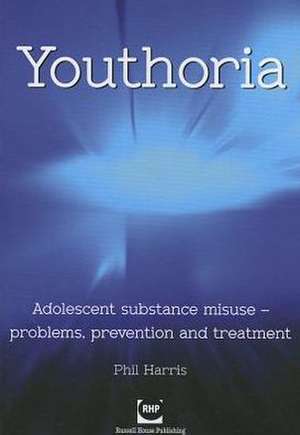Youthoria
Autor Phil Harrisen Limba Engleză Paperback – 16 ian 2013
Preț: 251.44 lei
Nou
Puncte Express: 377
Preț estimativ în valută:
48.12€ • 49.95$ • 40.12£
48.12€ • 49.95$ • 40.12£
Carte indisponibilă temporar
Doresc să fiu notificat când acest titlu va fi disponibil:
Se trimite...
Preluare comenzi: 021 569.72.76
Specificații
ISBN-13: 9781905541829
ISBN-10: 1905541821
Pagini: 280
Dimensiuni: 175 x 244 x 18 mm
Greutate: 0.57 kg
Ediția:New.
Editura: Russell House Publishing Limited
ISBN-10: 1905541821
Pagini: 280
Dimensiuni: 175 x 244 x 18 mm
Greutate: 0.57 kg
Ediția:New.
Editura: Russell House Publishing Limited
Notă biografică
Phil Harris is an independent writer who has worked in direct access drug services for over twenty years. He has designed and delivered internationally recognised treatment programmes and accredited training courses throughout the UK & Europe. Having worked as a drugs treatment advisor to DST's, Criminal Justice Services and Youth Services, he has also managed several organisations and implemented innovative, practical and effective approaches to addressing people's problems with misuse of drugs and alcohol. He continues to practise in the south west of England.
Cuprins
Introduction. Who is this book for? A A How common is substance use in young people? Introduction. Historical trends. Prevalence rates of tobacco, alcohol and drugs. Prevalence rates of drug and alcohol problems. Variation in substance use across cultures. Informal cultural control of use. Young peopleA fs use and the media. Variation within cultures. How young people acquire drugs and alcohol. Summary. A A What is adolescent development? Introduction. The evolution of the modern family. Perspectives on adolescent development. Parent and adolescent interactions. Puberty: physical changes. Puberty: cognitive changes. Life tasks. Identity formation. Changing relationships. Developmental delay and substance use. Adolescent mental health. Summary. A A How do substance use problems develop? Introduction. Models of cause and effect. Risk and protection factors. Key issues in risk and protection theory. Age of initiation. Gateway Theory. Substance abuse trajectories. Trajectories and mental health. Identifying sub-trajectories. Summary. A A What is problematic use in young people? Introduction. Origins of diagnosis. Substance abuse. Dependence. Young people and diagnostic criteria. The rate of acquisition of substance related problems. Screening. Comprehensive assessment: overview. Comprehensive assessment: dependence. Comprehensive assessment: social functioning. Comprehensive assessment: treatment planning. Future developments in diagnostic criteria. Summary. A A Can substance use be prevented in young people? Introduction. Prevention and education controversies. Defining drug and alcohol prevention and education. School based approaches to prevention and education. College and university based approaches. Family based prevention approaches. Mass media campaigns. Diversionary programmes. Multilevel programmes. Target interventions. The outcomes of prevention and education programmes. Core elements of effective programmes. Summary. A A Does treatment work for young people? Introduction. Treatment outcomes with young people. What really counts in treatment? Comprehensive treatment pathways. Specific modalities: pharmacotherapy. Specific modalities: controlled drinking programmes. Specific modalities: Motivational Interviewing. Specific modalities: Cognitive Behavioural and Behavioural approaches. Specific modalities: the Twelve Step Approach. Treatment matching interventions. Treatment for externalized disorders. Treatment for depression. Treatment for anxiety disorders. Treatment for Post-Traumatic Stress Disorders. Treatment for suicidal young people. Family involvement and treatment. Family involvement: motivating young people for treatment. Family involvement: family therapy. Family involvement: Family Conferencing and Network Therapy. Aftercare. Summary. A A Epilogue. References.
